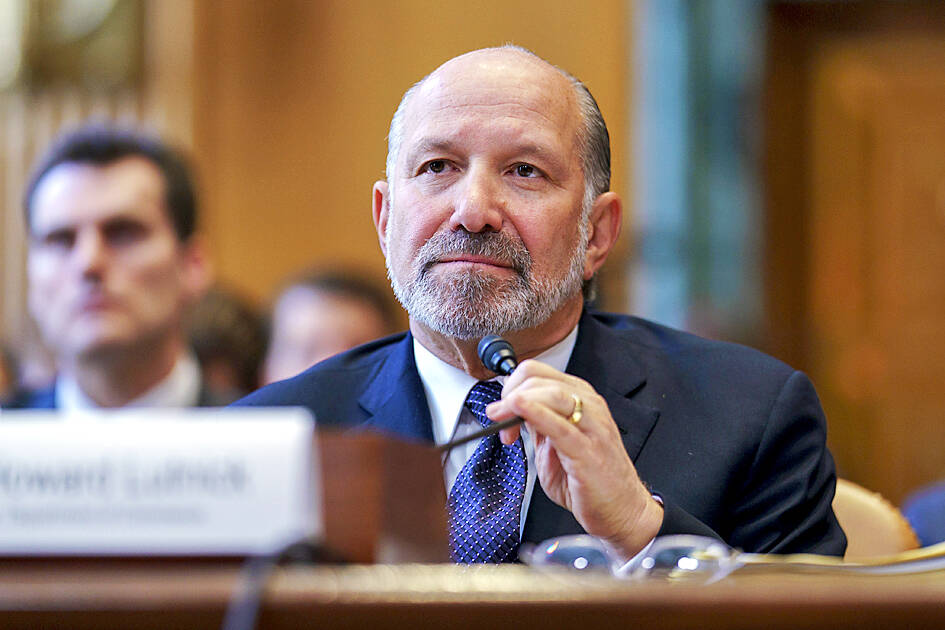US Secretary of Commerce Howard Lutnick on Wednesday said that the US government has been reworking agreements forged with semiconductor makers under the 2022 CHIPS and Science Act to secure what he called better terms aimed at generating additional domestic investment.
“Are we renegotiating? Absolutely, for the benefit of the American taxpayer, for sure,” Lutnick said at a meeting of the US Senate Appropriations Committee. “We’re getting more value for the same dollars.”
Lutnick cited the decision in March by Taiwan Semiconductor Manufacturing Co (台積電), a recipient of US$6.6 billion in grants, to boost its US investment commitment. The company is adding US$100 billion to a previous US$65 billion pledge, but without any additional funding from the US government, he said.

Photo: EPA-EFE
US President Donald Trump has urged the US Congress to repeal the 2022 CHIPS and Science Act that was a centerpiece of former US president Joe Biden’s domestic agenda, although Republican and Democratic lawmakers have little desire to revoke a bipartisan law promising US$52 billion in subsidies. Lutnick has previously signaled that the commerce department might withhold grants to press companies to follow in TSMC’s footsteps and expand their planned domestic semiconductor projects.
During his nearly two-hour appearance before the committee, Lutnick addressed a range of issues essential to the semiconductor industry, including the administration’s push to bring to the US more chips-related investment.
He defended artificial intelligence (AI) deals with the United Arab Emirates unveiled last month during Trump’s trip to the Middle East, saying the accords were crafted to spur complementary levels of spending in the US.
The Trump administration is moving toward negotiating individual deals with nations while maintaining security guarantees designed to prevent Chinese companies from obtaining AI chips.
“Our view is we are going to allow our allies to buy AI chips, provided they’re run by an approved American data center operator, and the cloud that touches that data center is an approved American operator,” Lutnick said.
The US has moved to pressure allies against adopting Huawei Technologies Co’s (華為) new Ascend chip, warning that any use risked breaching export controls imposed by Washington.
The commerce department last month said that it was to warn people about “the potential consequences of allowing US AI chips to be used for training and inference of Chinese AI models.”
Lutnick said that China still lacks the capability to produce high volumes of sophisticated semiconductors.
He estimated that China could probably produce about 200,000 advanced chips, like the kind used to train AI services or run smartphones, a tiny number compared with demand.
“They say they are making them and they are not,” he said.

Merida Industry Co (美利達) has seen signs of recovery in the US and European markets this year, as customers are gradually depleting their inventories, the bicycle maker told shareholders yesterday. Given robust growth in new orders at its Taiwanese factory, coupled with its subsidiaries’ improving performance, Merida said it remains confident about the bicycle market’s prospects and expects steady growth in its core business this year. CAUTION ON CHINA However, the company must handle the Chinese market with great caution, as sales of road bikes there have declined significantly, affecting its revenue and profitability, Merida said in a statement, adding that it would

RISING: Strong exports, and life insurance companies’ efforts to manage currency risks indicates the NT dollar would eventually pass the 29 level, an expert said The New Taiwan dollar yesterday rallied to its strongest in three years amid inflows to the nation’s stock market and broad-based weakness in the US dollar. Exporter sales of the US currency and a repatriation of funds from local asset managers also played a role, said two traders, who asked not to be identified as they were not authorized to speak publicly. State-owned banks were seen buying the greenback yesterday, but only at a moderate scale, the traders said. The local currency gained 0.77 percent, outperforming almost all of its Asian peers, to close at NT$29.165 per US dollar in Taipei trading yesterday. The

RECORD LOW: Global firms’ increased inventories, tariff disputes not yet impacting Taiwan and new graduates not yet entering the market contributed to the decrease Taiwan’s unemployment rate last month dropped to 3.3 percent, the lowest for the month in 25 years, as strong exports and resilient domestic demand boosted hiring across various sectors, the Directorate-General of Budget, Accounting and Statistics (DGBAS) said yesterday. After seasonal adjustments, the jobless rate eased to 3.34 percent, the best performance in 24 years, suggesting a stable labor market, although a mild increase is expected with the graduation season from this month through August, the statistics agency said. “Potential shocks from tariff disputes between the US and China have yet to affect Taiwan’s job market,” Census Department Deputy Director Tan Wen-ling

UNCERTAINTIES: The world’s biggest chip packager and tester is closely monitoring the US’ tariff policy before making any capacity adjustments, a company official said ASE Technology Holding Inc (日月光投控), the world’s biggest chip packager and tester, yesterday said it is cautiously evaluating new advanced packaging capacity expansion in the US in response to customers’ requests amid uncertainties about the US’ tariff policy. Compared with its semiconductor peers, ASE has been relatively prudent about building new capacity in the US. However, the company is adjusting its global manufacturing footprint expansion after US President Donald Trump announced “reciprocal” tariffs in April, and new import duties targeting semiconductors and other items that are vital to national security. ASE subsidiary Siliconware Precision Industries Co (SPIL, 矽品精密) is participating in Nvidia